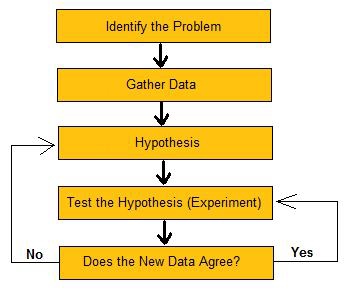
The Scientific Method, originated 400 years ago, is a major reason we have our modern world, with its high technology, long lifespans, robust populations, and luxuries. Given this, you’d think its place in education would be secure.
You’d be wrong.
In fact, it had been completely removed from the North Carolina K-12 Science Standards, supplanted by something called “Science and Engineering Practices” (SEP). And with what, precisely, does SEP replace the Scientific Method (SM)?
Computer models, according to reports.
Hey, what could possibly go wrong?
The good news: The SM has since been restored in North Carolina’s schools, thanks to the efforts of one concerned scientist. But here’s what many may find distressing:
Of the 14,000 “inputs” N.C. officials received about the curriculum, that lone scientist, physicist John Droz, was the only one who complained about the SM’s nixing.
What’s more, the battle against this attack on science is just beginning. For the pedagogy of which SEP is a part, “Next Generation Science Standards” (NGSS), is being embraced by education bureaucracies in 45 states.
(Meanwhile, China, which already creates 10 times as many scientists as we do, doesn’t entertain these fantastical ideas.)
The image below illustrates the steps of the SM, which is based on Isaac Newton’s work.

As for the assault on the SM, the CO2 Coalition’s Gregory Wrightstone has the story:
“Upon reading a review of the North Carolina K-12 Science Standards, I was concerned that nowhere was the Scientific Method even mentioned,” says Droz, who retired at 34 as a successful investor and launched a 40-year career as a “citizen advocate” of wide-ranging pursuits.
Having a particular concern about the current state of critical thinking, Droz ultimately filed a written complaint with the North Carolina Department of Public Instruction.
“They subsequently said that they had received some 14,000 inputs on the Science Standards, and apparently, I was the only one bringing up the issue,” said Droz, whose varied interests include climate science and election integrity.
Much as when people stand by apathetically while our heroes and history are erased, that Droz was one in 14,000 is distressing. Know, too, that the politically correct NGSS is not entirely new, as it was originated in 2012. And why has it gained such favor? It’s embraced, Wrightstone relates, by the National Research Council, National Science Teachers Association, and the American Association for the Advancement of Science.
The NGSS does not advance science, however. Rather, it’s a “disaster” for scientists, Wrightstone warns. “The Scientific Method requires that questions be asked, observations made, and hypotheses formulated, tested, and proven or rejected,” he explains. “Conclusions are always subject to challenges with new evidence and insights.”
“The NGSS scraps this centuries-old process for computer models whose products are proof of nothing unless they are verified against real-world data and survive the challenges of new information,” Wrightstone continues. “However, those criticizing the findings of this corruption of objective inquiry are often dismissed as ‘science deniers.’”
Realize here that a “computer model” is essentially just a hypothesis itself. Data are gathered and fed into a computer, which renders an assumption that, under the scientific method, would then be tested to ascertain if it’s true.
The problem is that this computer-generated hypothesis is often treated not just as a “theory” (which is more likely true than a hypothesis), but as fact. Advocates leap past the SM’s testing (experiment) and the “Does the New Data Agree” steps and present the matter as “settled science.”
In other words, a “science denier” here is merely a hypothesis denier — and hypothesis deniers (skeptics) are necessary for good science. They help ensure that assumptions don’t become dogmas before becoming proven.
Unfortunately, the hypothesis-as-fact routine is common. One example is the MUSS (Made-up Sexual Status, aka “transgender”) agenda, where many medical practitioners accept that such sexual statuses have biological bases without any proof whatsoever that this is so. Wrightstone provides an even more apropos example — the greentopian climate agenda — whose activists use computer models to justify sweeping, economy-rending policy changes (e.g., banning petrol-powered cars and gas stoves, nixing pipelines).
Computer models are especially attractive in climate science because the SM’s “testing” step cannot be undertaken. “We have virtually no ability to run controlled experiments, such as raising and lowering CO2 levels in the atmosphere and measuring the resulting change in temperatures,” the Hoover Institution explained in 2017.
What we can do, Hoover continued, is “build elaborate computer models that use physics to calculate how energy flows into, through, and out of our planet’s land, water, and atmosphere.”
Yet while “such models have been created and are frequently used today to make dire predictions about the fate of our Earth,” Hoover also writes, they “have serious limitations.”
In reality, computer models are much like “consensus”: Citing them as dispositive is pseudo-scientific folly. One would never say, “Computer models indicate that Force=Mass×Acceleration” or “Computer models indicate there are 118 chemical elements.” Talking that way would be laughable. Science is about providing actual proof, truly reproducible results. When people cite only computer models (or consensus), it’s a tacit admission that they don’t have the proof.
So what’s the appeal of the NGSS? Propaganda value, for one: “In classrooms, students are encouraged by the NGSS to conform to politically correct views,” states Wrightstone. Moreover, as with any new teaching paradigm, you can bet there are entities making millions off peddling it.
What’s the bottom line here? G.K. Chesterton once observed, “Nine out of ten of what we call new ideas are simply old mistakes.” NGSS is among the nine and must be deep-sixed.
Related video:
John Droz: “New” Science Is Marxist Indoctrination




